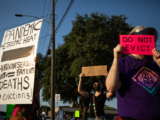
Seattle will keep enforcing hazard pay for grocery store workers
August 11, 2021Seattle will have employers continuing to shell out hazard pay for grocery store workers as Washington contends with more pandemic worries.
Seattle City Councilmember Teresa Mosqueda, who chairs the city’s Housing and Finance committees, made the call on Monday to delay a vote on ending hazard pay the council passed in January. The vote would have ended the extra $4 more per hour for grocery store employees working on the frontlines but retain most public health rules like the availability of personal protection equipment.
Mosqueda said Monday that she did not make the decision lightly. Washington’s rising COVID cases, she said, as well as the virus’s more infectious delta variant, adds to the state’s caseload.
“As the delta variant shows, we’re not out of the woods yet when it comes to battling this virus and returning to a new normal,” Mosqueda said. “Many Seattle families are still struggling financially and unable to pay their rent, many seniors are still isolated from their loved ones and communities, and our transportation systems struggle with ridership as more businesses push back their return-to-office dates.”
Monday’s news follows the passage of the Seattle Rescue Plan 2 by a unanimous vote, which devotes $52.2 million in federal dollars to rental aid, senior services and transportation.
The legislation includes $28.7 million in rental assistance for United Way of King County and the Office of Housing, among others, to cover housing-related costs, including internet services and homelessness prevention services for low-income households. Another $7.8 million will go to senior services like transportation, case management, meal delivery and caregiver support.
Around $13.5 million of the plan will fund construction of the Madison Street Bus Rapid Transit, backfill revenues lost to the pandemic and support Seattle’s streetcar and monorail systems.
Finally, the plan’s $2.2 million for McCaw Hall performing arts theater will cover payroll, utility and other business expenses which it was awarded through a prior federal grant.
The council passed Seattle’s first $128.4 million Rescue Package in June 2020, which put up $49.2 million for homeless services, $23.5 million for small business recovery and $7.6 million to reopen city programs and services. The city expects to receive another $116 million in federal funds by May 2022.
Both Seattle and King County continue to boast some of the highest vaccination rates in the state and the nation. The two metro areas are also seeing rising caseloads that pale in comparison to cities around the country. Based on King County Public Health data, Seattle has not seen a death from COVID-19 since July 11.
Public employees in the city, county and statewide have until October to get their shots under various mandates going all the way up to Gov. Jay Inslee.
“We are going to continue to review the best public health information as we continue to look at this legislation,” Mosqueda said. “We want to protect not only frontline grocery workers but also the members of the public that they also interact with.”
The Seattle City Council vote on grocery store hazard pay is now rescheduled to Sep. 13.
This article was originally posted on Seattle will keep enforcing hazard pay for grocery store workers


